Oncor To Increase Rates
SK Energy · May 3, 2017
Oncor Electric Delivery Wants To Increase Its Rates
Oncor Electric Delivery wants to increase its rates. The last time Oncor raised rates was 2011. For most businesses, a price increase means just that. But for a regulated utility, it is very different and much more difficult.
Oncor is a regulated electric utility in the state of Texas. Because they are regulated, they must ask for rate increases from the Public Utility Commission of Texas and all the cities they serve. It requires a thorough audit of its financial records looking for evidence of the need for the increase. It is not an easy process for a regulated utility.
Why is Oncor Deregulated?
Texas Senate Bill 7, approved in 2002, marked the beginning of electricity deregulation in Texas. SB7 effectively split the old electricity monopolies into three separate companies, power generators, retail electric providers and electric utilities.
The power generators use coal, nuclear, wind, solar, natural gas and other biofuels to produce electricity. Power generators are the wholesalers of electricity and not regulated. The retail electric providers buy bulk power from generators and sell it to consumers like you and me for a profit. These are the companies you have heard of like Gexa Energy, TXU and Reliant. Like power generators, they are not regulated.
Electric utilities are the companies that own the substations and transmission and distribution lines you see ever y day. Electric utilities don’t buy o
y day. Electric utilities don’t buy o
r sell; instead they transport the electricity from the power generators to the consumers. Electric utilities charge retail electric providers to transport the electricity for them. These charges are usually passed along by the retail electric providers to you the consumer. You see it on your bill as TDSP or delivery charges.
How Will The New Rate Affect Me?
If the rate increase is approved without changes, the typical Dallas homeowner that uses 1300 kWh in a month would pay about $6.84 more. Currently, Oncor charges about 3.3 cents per kilowatt-hour. The new rate would be around 3.8 cents per kilowatt-hour. Overall, Oncor’s new rates would still be some of the least expensive in the state.
You can’t get away from the delivery charges. The rates that electric utilities charge are needed to maintain and improve the infrastructure and provide all of us with electricity and to keep the lights on.
But all this doesn’t mean you have to pay more. The other charges on your bill are for energy. It is the cost and profit retail electric providers charge. The charges vary by retailer and contract length. Retailers use weather indicators, natural gas prices and other indicators to forecast their costs for wholesale power. So it just natural that forecast in the next three months are better than forecast next year. That’s why shorter contracts have lower rates.
SK Energy uses our expertise to find the best rate and retailer for you. They switch your provider for you and, when it’s time to change, make all the needed calls and enrollments for you, saving you time and hassle. For your free savings quote fill out the request form. We would love to hear from you.